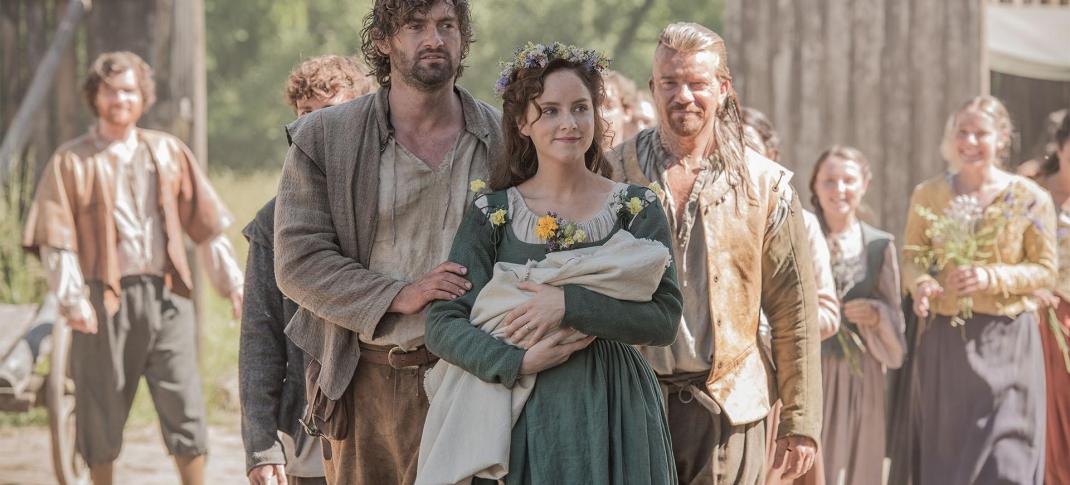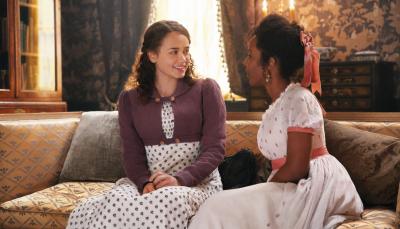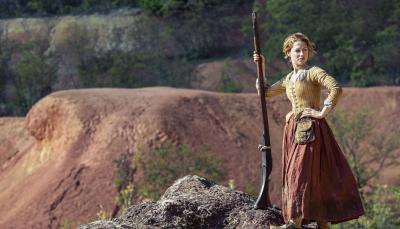‘Jamestown’ Recap: Season 2, Episode 1

Previously on Jamestown: There is way too much to sum up in a paragraph, merely suffice to say that three very different women are brought to the colony of Jamestown to start new lives (and marry some of the settlers). A whole lot of stuff happens after that. Skim the Season 1 recaps if you need a refresher on the details, because this story is wild. (And a whole lot of fun along the way.)
Reminder: Jamestown is a Passport-exclusive series, meaning that in order to watch it, you’ll need to be a Passport member (If you have Amazon Prime, you’ll also be able to watch the series week-by-week over on the PBS Masterpiece channel.)
Season 2 of Jamestown generally picks up a few months after the first season. But lest you think that the period drama’s second season might turn more serious, what with the arrival of slaves in the colony and the formation of an actual governing body at the end of last season, don’t worry. Before the opening credits roll there’s already been a murder and an accident leading to the onset of childbirth, so it appears as though things will continue to be as crazy as ever in 17th century Virginia.
The new season opens with a predictably insane scene, involve Alice falling down a hill and going into labor in what presumably is the James River. (As someone who grew up on the shores of that river in Richmond, I'm pretty sure I would not want to give birth in it, but maybe it was cleaner back in 1619.) Anyway, thanks to Verity and the completely random presence of slave girl Maria (who is…a midwife apparently?), Alice is safely delivered of a boy and the whole colony rejoices. Given that the Yeardleys immediately try and claim the baby for the entire town, there’s a certain symmetry to the fact that Jamestown’s firstborn found life in the river that surrounds it.
Other than give birth, Alice doesn’t get much to do this week. She eventually stands up to the Yeardleys and names her baby Silas after his father, rather than James for the king the way the governor wanted. There’s something hilarious and also kind of wrong about the colony’s attempt to use the successful delivery of a child as a propaganda device, so in many ways it’s a relief that Alice rediscovered her backbone in time to reject the idea. Now if only she could get rid of Henry, who is unfortunately 1.) still alive and 2.) still hovering around the Sharrow household trying to pretend that he isn’t a rapist. Lord help the woman he manages to buy for his second attempt at a bride.

Elsewhere, Samuel Castell’s dead body is discovered in the river, leaving Jocelyn a widow and the town with a mystery: What happened to him? Nobody could possibly believe a man like Samuel knew – or cared – about taking a fishing trip. Jocelyn, however, has more pressing problems, as his death means she’s homeless with no income. And even though her husband has been dead for less than 24 hours, everyone’s already talking about how she needs to marry again, since we all know that women in this colony have no power or agency except that which is granted them through the permission of a man. And while it’s fun to watch Jocelyn scramble for her livelihood – never count that woman out of anything – it’s also terribly depressing. Despite her obvious intelligence and grit, the town simply refuses to see her as anything other than an accessory to the man in her life. (Looking at you, Farrow and Redwick.) In that regard, it makes sense that Jocelyn would crave the independence and relative power that being a widow might provide. If, you know, she had land or money to live off of. Her attempt to blackmail Yeardley into giving her her house back is a good start, though. Go, Joss!
Verity’s doing her best to help both of her friends this week, providing comfort to Alice and refuge for Jocelyn, but once again Jamestown hasn’t let us see much of her perspective on anything else. Her determination to help Maria adjust to life in the colony is admirable, though perhaps a bit misguided given the generally harsh realities facing a slave. It also ties nicely back to Verity’s own past – she’s lost a child herself, which presumably must be the driver behind her sudden baby fever now in the wake of Alice’s pregnancy. In Maria, though the girl is a slave, Verity sees a fellow survivor, and though she clearly doesn’t understand what it means to start life over again when you have no choice in the manner or direction of it, she at least means well.
The introduction of slaves to the colony adds an intriguing – and often uncomfortable – narrative wrinkle. Jamestown makes sure that it shows us the brutality involved in owning another person. (Pedro is frequently beaten, chained and generally dehumanized by the bulk of the settlers whenever possible.) Yet, it also takes care to underline that many settlers dislike the idea of slavery and wish that Jamestown would not be involved in it. True, most of those people – save Verity – don’t do much about their feelings and passively allow the practice to continue, even going so far as to help the horrible Massinger beat or restrain his “property”. Perhaps it is too much to hope for that the settlers will ever free the slaves or make them legitimate residents in all but name. Jamestown is generally bound by the beats of history after all, for good and ill. That said, some slaves in the settlement were eventually seen as indentured servants, much as the white Englishmen were, and thus earned their freedom the same way. This is clearly what Pedro is hoping for, and why he’s angling so hard for Governor Yeardley to buy him.

For the most part, Jamestown does a good job of depicting the thorny issue of slavery in the colony. It remains to be seen whether this is the sort of show that can handle a story like this with anything approaching nuance, particularly given that literally every aspect of Massinger’s character is an evil slaveowner stereotype. That said, the premiere’s depictions of Pedro and Maria are intriguing, giving both of them understandable layers. Maria, who refuses to let go of the life and family she left behind, is instantly sympathetic. And Pedro’s insistence that he can somehow still build a life for himself in the New World as a free man is compelling, even if it might be hard for some of us watching to understand how that could ever happen, given what we know about what will happen in America in the years to come. We want that to be possible though, even if we know it’s probably unlikely.
What did you think of the Season 2 premiere? Are you excited that Jamestown is back? Sad about Samuel? Let’s discuss!



